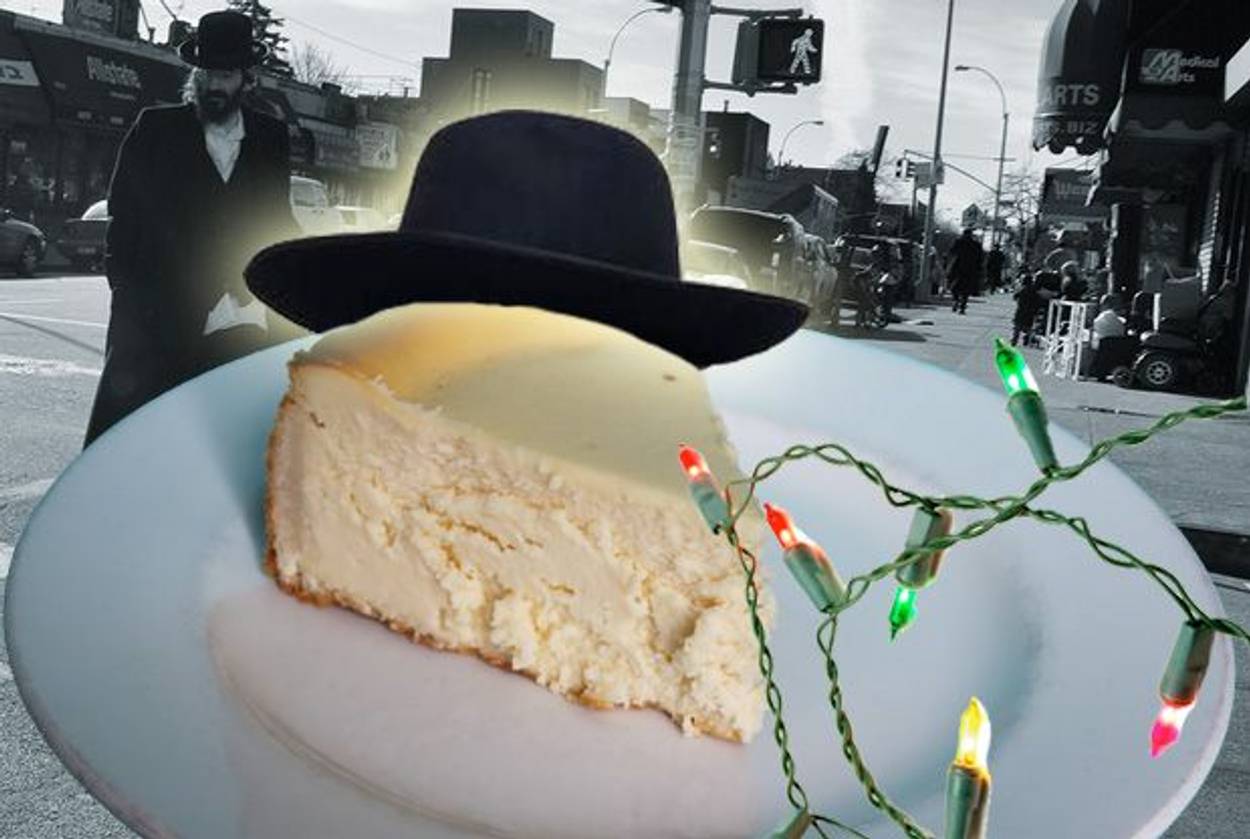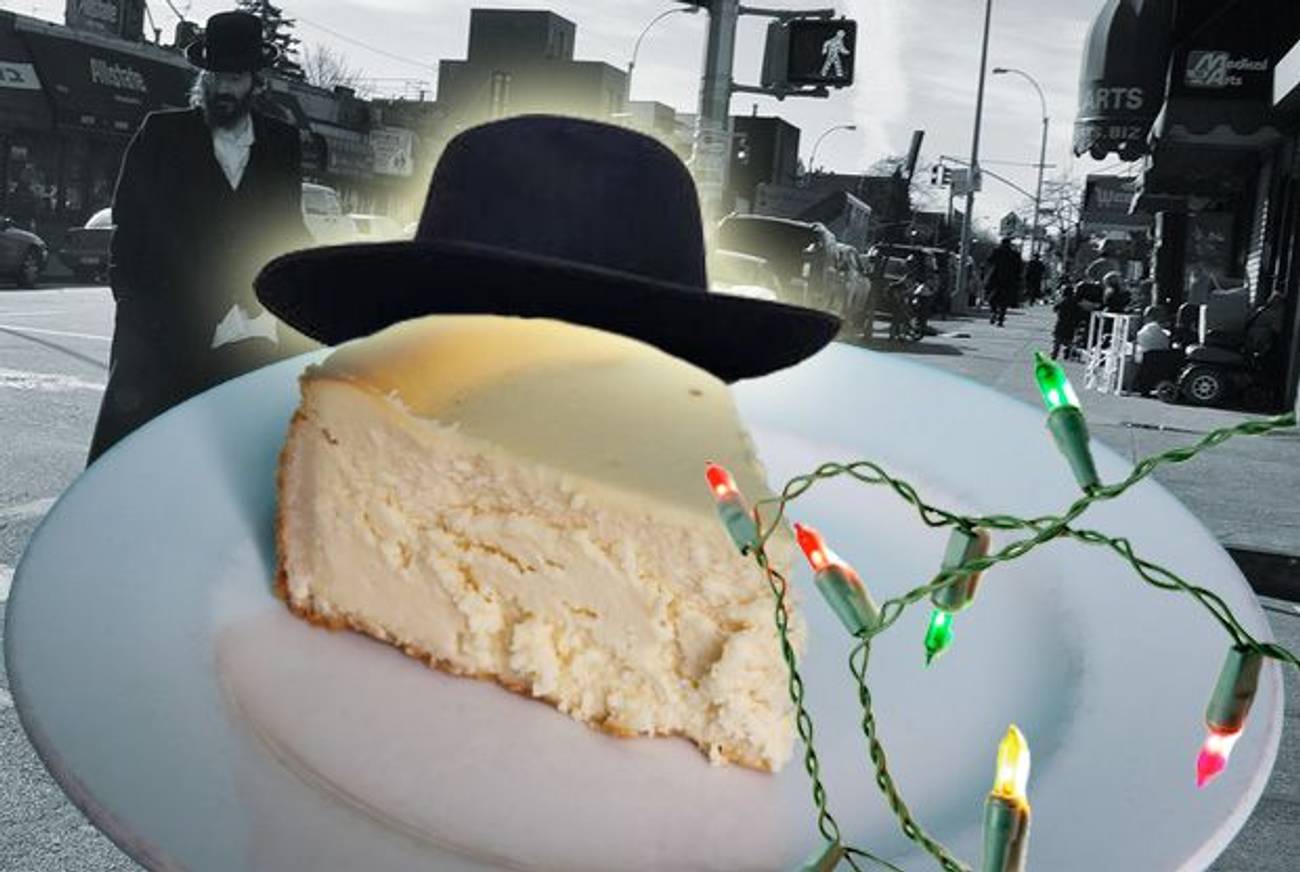A Rabbi’s Christmas
A shopping trip to Borough Park on Dec. 25 reveals a lesson about pious passivity and dignity—and the value of human relations




Four years ago, my father, a rabbi, decided on Christmas Day to make his annual pilgrimage from Queens, where he lives, to Kova Quality Hatters, the landmark and institution in Borough Park, Brooklyn, to buy hats. Kova provides black hats, fedoras, homburgs, and other varieties of headdress to thousands of Orthodox Jewish men, and now that I’m well into my 40s, I have been going there with my father for decades.
While other precincts of New York City take on a tranquil, almost ghost-green glow on Christmas, Borough Park, the Hasidic enclave, teems with commerce and activity on this holy day. Its main drag, 13th Avenue, has the feel of an Asian city: Shanghai or Hong Kong minus the rickshaws and the pedicabs. Cars and pedestrians compete for room and air in narrow straits, and the street has the ambience of an urban bazaar, with chains and banks nestled next to mom-and-pop stores selling clothing, housewares, and just about everything else. The primary objective on our annual shopping trips was to buy a hat for my father, but the outing came with a number of blandishments and outright gifts for me: usually an article or two of clothing, and a post-shopping meal in a neighborhood restaurant.
My father is gimp-legged after he was hit by a car 30 years ago, but he lives a surprisingly nomadic existence in the greater New York area, often reaching all of the city’s five boroughs and many of its suburbs in a single day of rabbinical work. He drives a sporty, silver, late-model Cadillac, and frequently, at day’s end and too far afield to eat at home, he winds up in a kosher restaurant. One might think him to be a kosher-restaurant connoisseur, but he tends not to pay them any mind. In fact, my father’s dining preferences range from deli to dairy, and not much beyond that. My earliest memories of eating with him were in his haunts on the Lower East Side—Sam’s 999 on Essex Street, where he’d order pastrami and a Heineken, and Steinberg’s upstairs dairy restaurant, where he’d have smoked whitefish, coffee, and cheesecake for dessert.
On Christmas Day four years ago, after we had chosen the hat, we then had to choose a restaurant. Did we want milchig or fleishig, dairy or meat? We chose an upscale dairy restaurant. The restaurant was packed with late lunchers like us. There were mothers with strollers and finger-fed babies. Toddlers ate baked ziti, indolent children ate white rolls with butter, and businessmen nattered on at corner tables over lox and sable. My father and I stood for 20 minutes until a table opened near the swinging-door entrance to the kitchen. Then we sat there for another 20 minutes until service arrived. The waiter, who looked like an apparatchik for Josef Stalin, took our order.
My father took out his reading glasses to study the menu, even though he knew what he wanted. “Smoked whitefish,” he told the waiter.
“What else?” the waiter asked.
“That’s it.”
“That’s it?” the waiter said, incredulously.
“You have decaf?” my father asked.
“No. No decaf,” said the waiter.
“Mushroom barley soup?”
“No. Split pea only.”
“Potato salad?”
“No.”
“Tuna salad?” I asked.
“We’re out.”
“Egg salad?”
“Blintzes only, with sour cream,” he said. “I have to get to other tables. Make up your mind.”
“OK,” I finally said. “Split pea soup and a vegetable omelet. Can you bring my father a seltzer?”
“No seltzer,” the waiter said.
A restaurant with no seltzer? I began to consider the idea that our waiter had traces of sadism. He was short and stout and had the air of someone who had been humiliated often, probably in a faraway land. I thought of him as one of those nondescript soldiers you see in newsreels from a forgotten conflict, like the Russo-Finnish war, perhaps a private in charge of the horses or the latrine. And to deprive my father of seltzer, if indeed he were doing so, was cruel. My father’s love for seltzer cannot be understood in purely physical or even gastronomic terms. It is simply part of him, long fetishized by his digestive track. Still, what was there to do?
We sat for another 20 minutes waiting for our food. It wasn’t a big deal: The restaurant was busy. My father and I passed the time in small talk. We made calculations on our napkins, refinancing our mortgage payments and family budgets. When our portions arrived, we ate silently and, in my father’s case, industriously—storing up glucose for whatever intellectual, physical, and monetary challenges lay ahead.
Then it was time for dessert. It would be cheesecake. Because we were sitting near the kitchen, I had a glimpse of a platter of store-bought cheesecake slices. There were regular, marbled chocolate, and blueberry cheesecakes. While I was in the restroom, my father ordered plain cheesecake. Upon my return, I urged him to reconsider, telling him the marbled chocolate cheesecake was much better, and he agreed. I called to the waiter. “My father changed his mind,” I said. “Instead of the New York plain cheesecake, he wants the marble chocolate cheesecake.” The waiter looked at us in disgust and said, “Once I put in the order, I cannot change it.”
He then spun away and returned shortly with a plate of the plain cheesecake. My father, who had spent his childhood in the Bronx, knew how to be grateful for food and to those who made it. His grandmother kept a carp in the bathtub to make gefilte fish for the Sabbath, and live turkeys occasionally appeared in their apartment to be slaughtered. But here, my father was surprised and annoyed that he was not permitted to have what he wanted for such a niggling and inadequate reason. Never one to make waves, though, he picked up the fork and ate the cheesecake like a boy fearful of offending his mother. “It was good cheesecake,” he said. “But not as good as the marble cheesecake would have been.”
The waiter brought the check, and my father again put on his reading glasses to study it. He took out his credit card. “Are you going to tip this monster?” I asked him. “Well,” my father said sheepishly, “not that he deserves any, but something I suppose.” I said that I wouldn’t tip him at all. My father considered this for a moment and then shook his head slowly. “Ich kenne nichts,” he said. “I don’t know. I can’t do it. I can’t take away his parnassah,” his livelihood.
Centuries of pious passivity had become the gravity that kept my father connected to his loved ones and to his work. His attachments were carefully sewn and cherished, sometimes overly so. To ask my father to withhold the tip was in effect to ask him to depart from a worldview that had kept him going for years. My father’s father was an immigrant house-painter who was both sustained and oppressed by slum lords, painting closets and hanging wallpaper for $20 a room. The fact that my father had ascended the economic ladder enough to drive a Cadillac would only intensify and amplify an indictment of his soul should he withhold the pay of a working man to teach him a lesson about courtesy and civility.
“But Dad,” I said. “This man mistreated us. He was abusive.”
“What should I tell you?” he said with the air of a man who had been asked to do something soul-damaging, like slaughter a calf or put a horse to sleep. “You’re right, but I can’t do it.”
In the face of mistreatment, my father could do nothing, as his father before him could do nothing when his clients decided cavalierly to pay him less than the agreed-upon fee. And standing there in front of my father, with a 150-year potpourri of Jewish piety and passivity—and of honor and dignity—between us, I too could do nothing but, in effect, turn the other cheek on Christmas Day.
Alter Yisrael Shimon Feuerman, a psychotherapist in New Jersey, is director of The New Center for Advanced Psychotherapy Studies. He is also author of the Yiddish novel Yankel and Leah.